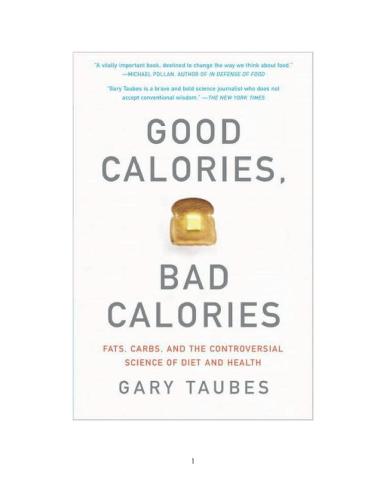
Good Calories, Bad Calories
Challenging the Conventional Wisdom on Diet, Weight Control, and Disease
به چالش کشیدن عقل سلیم در رژیم غذایی، کنترل وزن و بیماری
کتاب های مرتبط
- اطلاعات
- نقد و بررسی
- دیدگاه کاربران
نقد و بررسی

Starred review from August 27, 2007
Taubes's eye-opening challenge to widely accepted ideas on nutrition and weight loss is as provocative as was his 2001 New
York Times Magazine
article, “What if It's All a Big Fat Lie?” Taubes (Bad Science
), a writer for Science
magazine, begins by showing how public health data has been misinterpreted to mark dietary fat and cholesterol as the primary causes of coronary heart disease. Deeper examination, he says, shows that heart disease and other “diseases of civilization” appear to result from increased consumption of refined carbohydrates: sugar, white flour and white rice. When researcher John Yudkin announced these results in the 1950s, however, he was drowned out by the conventional wisdom. Taubes cites clinical evidence showing that elevated triglyceride levels, rather than high total cholesterol, are associated with increased risk of heart disease—but measuring triglycerides is more difficult than measuring cholesterol. Taubes says that the current U.S. obesity “epidemic” actually consists of a very small increase in the average body mass index. Taube's arguments are lucid and well supported by lengthy notes and bibliography. His call for dietary “advice that is based on rigorous science, not century-old preconceptions about the penalties of gluttony and sloth” is bound to be echoed loudly by many readers. Illus.

September 15, 2007
Journalist Taubes joins the scientific fray on the causes of obesity in modern society. Departing from the conventional thought that overeating and sedentary behaviors are the major culprits, he focuses on refined carbohydrates and sugars as causes of diabetes, heart disease, and other illnesses. He highlights studies to show how research outcomes have been biased or manipulated to fit conventional theories about health, diet, and weight. He discusses the politics that often steer research in a direction other than where the evidence actually leads, as well as researchers own preconceived biases that influence results. Taubes details what he sees as flaws in hundreds of scientific studies, disputing findings that drive modern nutritional practice. Some of his own premises about diete.g., consuming too many calories does not cause people to become overweight and dietary fat does not increase ones risk of heart diseaseare controversial. While the book is thought-provoking, its sheer volume of detail and complexity of writing will deter all but the most determined readers. Not recommended.Janet M. Schneider, James A. Haley Veterans Hosp., Tampa, FL
Copyright 2007 Library Journal, LLC Used with permission.

August 1, 2007
Noted science journalist Taubes probes the state of what is currently known and what is simply conjectured about the relationship among nutrition, weight loss, health, and disease. What Taubes discovers is that much of what passes for irrefutable scientific knowledge is in fact supposition and that many reputable scientists doubt the validity of nutritional advice currently promoted by the government and public health industry. Beginning with the history of Ancel Keys research into the relationship between elevated blood-cholesterol levels and coronary heart disease, Taubes demonstrates that a close reading of studies has shown that a low-cholesterol diet scarcely changes blood-cholesterol levels. Low-fat diets, moreover, apparently do little to lengthen life span. He does find encouragement in research tracking the positive effects of eliminating excessive refined carbohydrates and thus addressing pernicious diseases such as diabetes. Taubes' transparent prose brings drama, excitement, and tension to even the most abstruse and clinically reserved accounts of scientific research. He is careful to distinguish the oft-confused goals of weight loss and good health. Given Americas current obsession with these issues, Taubes challenge to current nutritional conventional wisdom will generate heated controversy and create popular demand for this deeply researched and equally deeply engaging treatise.(Reprinted with permission of Booklist, copyright 2007, American Library Association.)

























دیدگاه کاربران